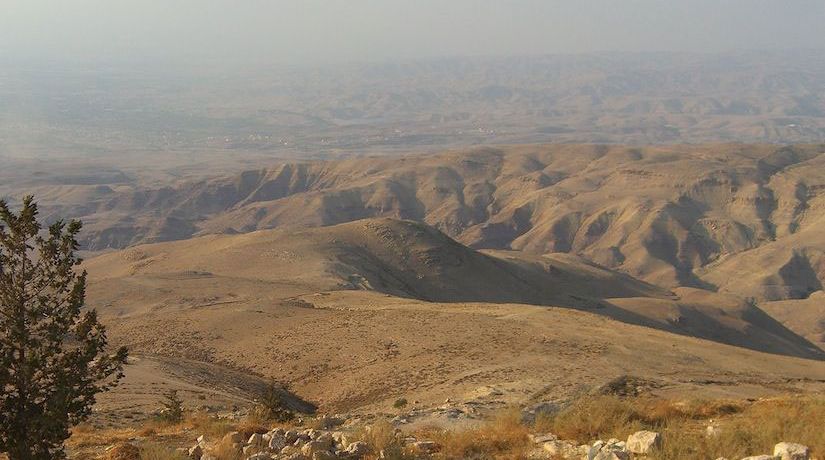Widely renowned as one of Israel’s greatest prophets, what were Moses’ key messages to ancient Israel? What prophecies of Moses remain relevant for us?

The prophet Moses viewed the Promised Land from Mount Nebo before he died (photo by David Treybig).
The prophet Moses is famous for his role in leading the children of Israel out of slavery in Egypt in the 15th century B.C. He is also credited with writing the first five books of the Bible. An editor later penned an insightful overview of this acclaimed prophet’s ministry at the conclusion of Moses’ fifth book:
“But since then there has not arisen in Israel a prophet like Moses, whom the LORD knew face to face, in all the signs and wonders which the LORD sent him to do in the land of Egypt, before Pharaoh, before all his servants, and in all his land, and by all that mighty power and all the great terror which Moses performed in the sight of all Israel” (Deuteronomy 34:10-12, emphasis added throughout).
The life of Moses can be divided into three 40-year periods. His first 40 years were spent in Egypt; the next 40 years, in Midian; and his last 40 years were spent serving as a prophet of God (Acts 7:30; Exodus 7:7; Deuteronomy 34:7). This article will focus primarily on his role as a prophet.
A reluctant prophet
Although some modern interpretations suggest that Moses had personal aspirations for leadership that enabled him to become the spokesperson and leader of his people, such suppositions are not supported by the Scriptures. After fleeing Egypt as a fugitive for having killed an Egyptian (Exodus 2:11-15), Moses came to Midian, where he met Reuel and his seven daughters.
The scriptural record tells us: “Then Moses was content to live with the man, and he gave Zipporah his daughter to Moses” (verse 21). Several decades passed until the king of Egypt died. During that time the servitude of the Israelites became even more burdensome so that they groaned and cried out because of their bondage (verse 23).
Hearing the cry of the Israelites, God then appeared to Moses in a burning bush and appointed him to serve as His messenger and liberate His people (Exodus 3:1-6). After explaining that He had heard the Israelites’ cries and seen their oppression, God said to Moses, “Come now, therefore, and I will send you to Pharaoh that you may bring My people, the children of Israel, out of Egypt” (verse 10).
“But Moses said to God, ‘Who am I that I should go to Pharaoh, and that I should bring the children of Israel out of Egypt?’” (verse 11). Instead of immediately accepting the opportunity, Moses tried to decline this call from God. God told Moses that He would help him, and He also told Moses what words to use in explaining to the children of Israel, the elders of Israel and the king of Egypt what God was orchestrating.
In response to Moses’ fear that people would not believe that God had appeared to him (Exodus 4:1), God gave Moses three miraculous signs:
- Changing a rod into a snake and then back into a rod.
- Making his hand leprous and then healthy once again.
- Turning water into blood.
Moses could use these three signs to demonstrate that God was working through him (verses 2-9).
Still not convinced, Moses told God: “O my Lord, I am not eloquent, neither before nor since You have spoken to Your servant; but I am slow of speech and slow of tongue” (verse 10).
Even though God told Moses, “Now therefore, go, and I will be with your mouth and teach you what you shall say” (verse 12), Moses was still reluctant to accept God’s call. Moses responded: “O my Lord, please send by the hand of whomever else You may send” (verse 13).
Moses’ continued reluctance angered God, yet God countered this worry by allowing Moses’ brother, Aaron, to serve as his spokesman (verses 14-16).
This account of Moses’ calling is consistent with how God operates: He chooses those He wishes to serve as His prophets. In spite of Moses’ initial reluctance to serve as a prophet, he grew in his relationship with God; and by the end of his life, he had successfully served in the role to which he was called.
Interestingly, Moses’ relationship with God grew to the point that he received high praise from His Creator. When “Miriam and Aaron spoke against Moses because of the Ethiopian woman whom he had married” (Numbers 12:1), God revealed His assessment of Moses.
Speaking directly to Moses’ brother and sister, God said, “Hear now My words: If there is a prophet among you, I, the LORD, make Myself known to him in a vision; I speak to him in a dream. Not so with My servant Moses; he is faithful in all My house. I speak with him face to face, even plainly, and not in dark sayings; and he sees the form of the LORD. Why then were you not afraid to speak against My servant Moses?” (verses 6-8).
Let’s now consider what God did through Moses in his roles as a leader, lawgiver and prophet.
Leader
Many are familiar with the account of Moses’ return to Egypt to lead the children of Israel out of bondage. The miracles God worked to show that Moses was a prophet of God and the 10 plagues that God brought upon Egypt to culminate in the freedom of the Israelites are recorded from the last part of Exodus 4 through Exodus 12.
While some assume that Moses was the person who delivered the ancient Israelites, the truth is that God is the One who gave them their freedom. Moses and Aaron were simply God’s spokespersons. As Moses and Aaron told Pharaoh, “Thus says the LORD God of Israel: ‘Let My people go, that they may hold a feast to Me in the wilderness’” (Exodus 5:1).
Moses and Aaron carefully explained that the messages and miracles were always from God. After the Israelites were free, Moses “told his father-in-law all that the LORD had done to Pharaoh and to the Egyptians for Israel’s sake, all the hardship that had come upon them on the way, and how the LORD had delivered them” (Exodus 18:8).
Lawgiver
It is quite common for people to refer to Moses as the great lawgiver of the Old Testament. To be precise, however, we should note that God was the Lawgiver. Moses was a prophet, a messenger of God.
When the children of Israel gathered at the base of Mount Sinai to hear the 10 Commandments, it was God who thundered out His commands. As the account in Exodus 20 begins: “And God spoke all these words, saying: ‘I am the LORD your God, who brought you out of the land of Egypt, out of the house of bondage’” (verses 1-2).
Having witnessed the thunder, flashes of lightning, the sound of a trumpet and the mountain smoking as God delivered His commandments, the people were fearful of hearing God speak again. “Then they said to Moses, ‘You speak with us, and we will hear; but let not God speak with us, lest we die’” (verses 18-19). God honored the people’s wish and, from this point on, God gave His additional messages and instructions, including the statutes and judgments, through His spokesperson Moses. After Moses died, God continued to speak to His people through the prophets.
Prophet
One of the most significant prophecies that God gave through His servant Moses was that in the future, He would raise up a Prophet like Moses. As Moses explained: “The LORD your God will raise up for you a Prophet like me from your midst, from your brethren. Him you shall hear” (Deuteronomy 18:15).
This future Prophet was prophesied to have God’s explicit backing. As God explained, “And it shall be that whoever will not hear My words, which He speaks in My name, I will require it of him” (verse 19). This Prophet was Jesus Christ. Echoing this prophecy, God told Peter, James and John during the transfiguration of Jesus: “This is My beloved Son, in whom I am well pleased. Hear Him!” (Matthew 17:5).
Jesus also stated that He was the fulfillment of this prophecy. While addressing the Jews, Jesus said, “You search the Scriptures, for in them you think you have eternal life; and these are they which testify of Me” (John 5:39). Continuing, Jesus added: “Do not think that I shall accuse you to the Father; there is one who accuses you—Moses, in whom you trust. For if you believed Moses, you would believe Me; for he wrote about Me. But if you do not believe his writings, how will you believe My words?” (verses 45-47).
As the people of the first century heard Jesus speak and witnessed His miracles, many of them realized that He was the Prophet of whom Moses had spoken. After miraculously feeding a great multitude of people with only five barley loaves and two small fish, “Then those men, when they had seen the sign that Jesus did, said, ‘This is truly the Prophet who is to come into the world’” (John 6:14). Others came to the same conclusion after Jesus spoke about the Holy Spirit on the last day of the Feast of Tabernacles (John 7:37-40).
After Christ’s crucifixion and resurrection, the apostles testified that Jesus was the fulfillment of the prophesied Prophet. Peter included this in his message on the Day of Pentecost, when the Holy Spirit was given (Acts 3:22-26).
A Muslim tradition offers an alternative explanation that claims that Muhammad was the Prophet spoken of by Moses. Yet this explanation is contradicted by the New Testament scriptures just considered. These scriptures make it clear that the Prophet spoken of by Moses was Jesus, not Muhammad.
Blessings and cursings
Another important prophecy delivered by Moses is what has become known as the blessings and cursings of Leviticus 26 and Deuteronomy 28. In these passages, God explained to the ancient Israelites the consequences of both obedience and disobedience to His laws. Under the covenant that God made with ancient Israel, God promised blessings for obedience to His laws and curses for disobedience.
Through subsequent years, the nation of Israel suffered as Moses had predicted when its citizens disobeyed God. Because of the people’s sins, they were conquered by other nations and scattered among the nations, as Moses had predicted (Deuteronomy 28:49-51, 64; Leviticus 26:33).
It is also significant to note that God promised through Moses that, even though the ancient Israelites and their descendants might stray from obeying God, He would not “utterly destroy them” (Leviticus 26:44). Many people recognize that the modern State of Israel is a fulfillment of this prophecy. Yet the State of Israel today represents only one of the 12 tribes of Israel—the Jews. To learn how this prophecy has been fulfilled for the other tribes, see the “12 Tribes of Israel” section of this website.
This agreement between God and ancient Israel is called the Old Covenant. Christians today are called to live under the New Covenant, which offers better promises, including the Holy Spirit. For further study, see “The New Covenant: What Is New About It?”
Although the Old Covenant has been replaced, the blessings and cursings proclaimed by Moses remain as enduring principles for nations and individuals. As the proverb states, “Righteousness exalts a nation, but sin is a reproach to any people” (Proverbs 14:34). Are you practicing righteousness? Be sure to read the articles on this website to help you understand what God expects you to do.
For more study on the prophets of the Bible, see the articles in this section “Prophets.”





